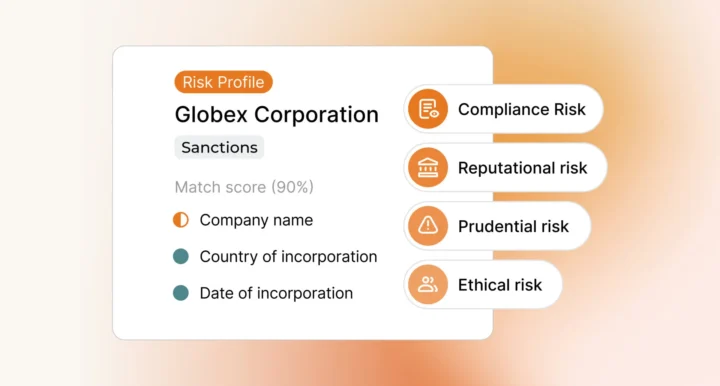Luxembourg is a small western European country with a global reputation for banking services and favourable tax laws. That reputation draws investment to the country, but also makes it a target for those who seek to use its financial system to launder money and commit other crimes. In 2021, a joint investigation by German and French journalists found that Luxembourg was being used to conceal funds linked to organised crime gangs from around the world. The report characterised Luxembourg as part of an “axis of tax avoidance” in Europe.
Luxembourg’s government has pushed back strongly against the notion that it is not doing enough to address financial crime, and has made significant recent efforts to bolster the country’s anti-money laundering (AML) and counter-financing of terrorism (CFT) regulations. Those efforts have led to increased regulatory scrutiny, and a need for firms operating within Luxembourg to ensure they understand their risk environment, and achieve regulatory compliance.
Given the importance of AML/CFT compliance in Europe and around the world, let’s take a closer look at Luxembourg’s AML regulations.
Luxembourg’s AML Regulator: The CSSF
Luxembourg’s primary AML regulator is the Commission de Surveillance du Secteur Financier (CSSF). Established in 1998, the CSSF is responsible for “ensuring that all the persons subject to its supervision, authorisation or registration comply with the professional AML/CFT obligations”. In this capacity, the CSSF provides oversight for all banks, investment firms, and other types of financial institutions operating in Luxembourg.
The CSSF’s duties and responsibilities include:
- Supervising and investigating financial institutions to ensure compliance with Luxembourg’s AML/CFT laws.
- Obtaining documents and other financial intelligence from persons under its supervision.
- Issuing sanctions against firms that do not comply with AML/CFT regulations. Sanctions may include warnings, fines, or occupational prohibitions.
Luxembourg is a member of the Financial Action Task Force (FATF), the Wolfsberg Group, and the EU, and so the CSSF actively participates in international efforts to combat financial crime. The CSSF shares information with international counterparts and participates in the European System of Financial Supervision (ESFS) with the objective of enhancing and harmonising AML/CFT standards across the EU.
Key Luxembourg AML Regulations
Luxembourg’s primary AML/CFT law is the Law of 12 November 2004 on the fight against money laundering and terrorist financing, also known as the AML/CFT Law. The law defines the offence of money laundering in Luxembourg and gives the CSSF its supervisory powers.
In alignment with FATF recommendations and EU objectives, the AML/CFT Law requires that firms in Luxembourg take a risk-based approach to compliance. In practice, this means that firms must conduct risk assessments to gauge the level of criminal risk that their customers present, and then deploy proportionate compliance measures, with higher risk customers subject to a greater degree of AML/CFT scrutiny.
EU AMLD: The EU issues periodic updates to its AML/CFT regulations, known as Anti-Money Laundering Directives (AMLD), which members must implement in domestic legislation.
Accordingly, Luxembourg amends its AML/CFT Law to incorporate details of new AMLDs. The Sixth Anti-Money Laundering Directive (6AMLD) came into effect across the EU on 3 June 2021, introducing a range of new AML/CFT compliance obligations including new AML predicate offences, expanded criminal liability for money laundering, and increased minimum penalties.
How to Comply with Luxembourg’s AML Regulations
Firms in Luxembourg must implement a risk-based compliance programme to meet their obligations under the AML/CFT Law. Effective AML compliance programmes in Luxembourg should include the following measures and controls:
- Customer due diligence: In order to assess risk accurately, firms in Luxembourg must perform suitable customer due diligence (CDD) to identify their customers. The CDD process should involve the collection and verification of names, addresses, dates of birth, and other identifying information. Higher risk customers should be subject to enhanced due diligence (EDD) measures.
- Beneficial Ownership: To prevent financial criminals concealing their identities with shell companies or corporate infrastructure, firms should also establish the ultimate beneficial ownership (UBO) of customer entities with which they do business.
- Transaction screening: Firms in Luxembourg should screen customer transactions for signs of money laundering. These might include unusually high transaction amounts, transactions with high risk counter-parties, or transactions that involve jurisdictions with inadequate AML controls.
- Watchlist screening: Firms should identify high risk customers, such as politically exposed persons (PEPs), by screening them against the relevant international watchlists.
- Sanctions screening: Customers that are subject to international sanctions pose a high AML/CFT risk. With that in mind, firms in Luxembourg should implement a sanctions screening solution to capture designations on the relevant lists, such as the EU’s Consolidated sanctions list.
Adverse media screening: News stories, and other media, often reveal changes in customer risk before any confirmation by official sources. Given the potential for news media (and other forms of media) to capture that information, firms in Luxembourg should integrate adverse media screening as part of their AML/CFT solution.
Adverse media screening (or negative news screening) requires firms to search for customer names across a range of domestic and international media sources, including traditional news outlets, blogs, social media platforms, and forum posts. Adverse media solutions should be capable of searching in multiple languages, and account for regional variations in spelling, non-Western characters, and other complicating language factors.
Recent AML Initiatives in Luxembourg
In 2022, Luxembourg made a series of amendments to the AML/CFT Law in order to clarify certain regulatory details. The amendments, introduced under the Act of July 2022, clarified:
- The limits of applying customer due diligence under the risk-based approach.
- The obligation to retain documents collected as part of the CDD process – rather than just listing references to those documents.
- The obligation to apply enhanced CDD measures for persons acting behalf of a client, or for PEPs.
- The obligation to compare collected beneficial ownership data to available beneficial ownership registers.
As an EU member, Luxembourg will also implement the upcoming Markets in Crypto Assets (MiCA) regulation. MiCA is a landmark regulation that will introduce new AML measures for the treatment of virtual assets, in particular stablecoins, and will introduce new licensing and registration requirements for cryptocurrency service providers. MiCA will be introduced across the EU in 2024.
Next Generation Screening in Luxembourg
To keep pace with Luxembourg’s AML regulations and manage emerging threats, firms must implement an agile, flexible screening solution capable of managing vast amounts of structured and unstructured data. The increasing complexity of AML regulations, and the sophistication of criminal methodologies, mean that manual AML solutions are no longer adequate – and risk not only negative customer experiences, but human error and costly compliance penalties.
Ripjar’s Labyrinth Screening platform is built to address modern screening challenges, with fast, flexible, accurate screening tools tailored to individual companies’ needs. Labyrinth Screening gives firms the power to search customer names against thousands of adverse media sources, watchlists, and sanctions lists in real time, in over 21 langues, and delivers actionable financial intelligence in seconds.
Powered by next generation machine learning technology, Ripjar has also deployed AI Risk Profiles as part of the Labyrinth Screening platform. AI Risk Profiles enable compliance teams to identify and extract the most relevant risk data on their customers, minimising false positive alerts while building detailed risk profiles for stronger, more accurate decision making.
Contact us to discuss how Ripjar can support your AML compliance in Luxembourg
Last updated: 6 January 2025





